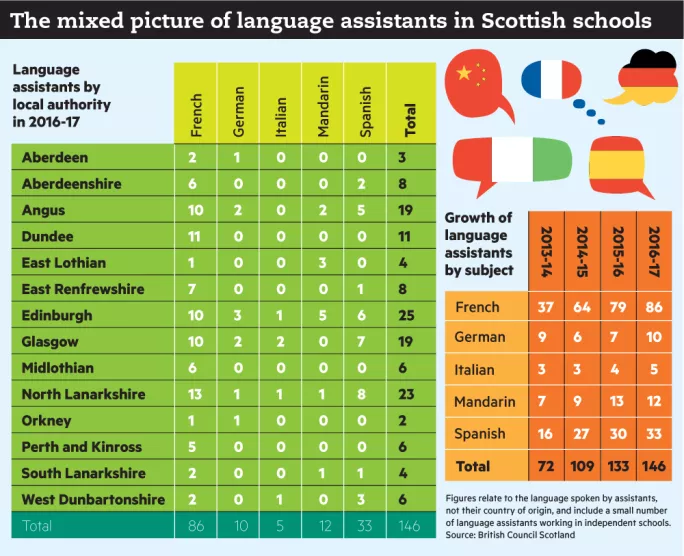Language assistants risk being lost in translation

Most schools still do not have access to a modern language assistant, new figures show, amid fears that the scheme will wither away if a key source of funding is stopped.
Native speakers of foreign languages have long come to Scotland to work in schools and help teachers to bring those subjects to life. But as local authorities cut budgets, their numbers fell as low as 72 by 2013-14.
Figures obtained by TESS show that the provisional number of modern language assistants (MLAs) has risen to 146 this year, including 23 in independent schools.
The data from British Council Scotland - which arranges for MLAs to work in the country - show increased numbers in all five languages that are part of the scheme: French, German, Italian, Mandarin and Spanish.
But there is still some way to go to match the 278 MLAs that were working in schools in 2005-06 - the highest number since existing records began in 2003.
The picture also varies markedly around the country: 18 of Scotland’s 32 local authorities have no MLAs, while Edinburgh has the most with 25, and even a small council like Angus has as many as 19.
‘Eye-opener’ for pupils
Lucy Young, head of education at British Council Scotland, said that councils often used funding from the Scottish government’s 1+2 languages programme to recruit MLAs at an annual cost of about £10,000 per assistant.
Under the programme - being rolled out in all primary schools - pupils are expected to have knowledge of two languages other than their own by the time they reach secondary.
But this key funding is due to be stopped in 2020 - putting schools’ access to MLAs at risk.
The investment in language assistants was vital, Ms Young said, because they were a way of engaging strongly with a language without travelling abroad: “It’s a kind of eye-opener for pupils - it allows them to use the language in a real-life situation,” she added.
‘Having a real speaker there can be a hook for children when they start to learn a language’
Gillian Campbell-Thow, chair of the Scottish Association for Language Teaching, said that the rise in MLAs was welcome and “testament to the hard work and determination of teachers, schools and local authorities to keep languages at the forefront”.
But she was concerned that the eventual loss of 1+2 funding would halt that growth.
“While we may be able to engage with speakers of languages in other capacities, with IT and so on, it does not replace having a ‘real’ speaker there, which can be a real hook for children when they start to learn a language,” she said.
Euan Duncan, president of the Scottish Secondary Teachers’ Association, said there was a “tremendous benefit” from pupils working with native speakers, and MLAs had become more important than ever as paperwork and red tape were making trips abroad “much more difficult to arrange”.
But Mr Duncan expressed fears that the UK’s impending exit from the EU could leave it “sidelined with regards to modern European languages opportunities”.
Uncertain times
Ms Young offered reassurance, however, that Brexit did not pose an obvious threat to MLAs, as British Council Scotland had made bilateral arrangements with each of the 14 countries providing language assistants - not all of which are in the EU.
She added that the prospect of Brexit made MLAs even more important: “We’re living in uncertain times, and I think that anything - whether that’s language assistants or any other sort of programme - that ensures we’re keeping as many international connections open as possible is a good and positive thing.”
One Edinburgh principal teacher of modern languages said that a former French MLA they had worked with had brought “youth, enthusiasm, motivation [and] tremendous support for the teachers”.
Catherine Mackenzie, curriculum leader for modern languages at Currie Community High School in Edinburgh said assistant Marianne Dupeux provided an up-to-date view of media and current affairs and was “an invaluable asset in our team”.
Speaking to the British Council, Ms Mackenzie added of Ms Dupeux: “She’s our walking dictionary - without her, our courses would not be as interesting.”

You need a Tes subscription to read this article
Subscribe now to read this article and get other subscriber-only content:
- Unlimited access to all Tes magazine content
- Exclusive subscriber-only stories
- Award-winning email newsletters
Already a subscriber? Log in
You need a subscription to read this article
Subscribe now to read this article and get other subscriber-only content, including:
- Unlimited access to all Tes magazine content
- Exclusive subscriber-only stories
- Award-winning email newsletters